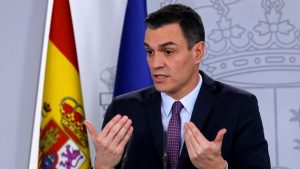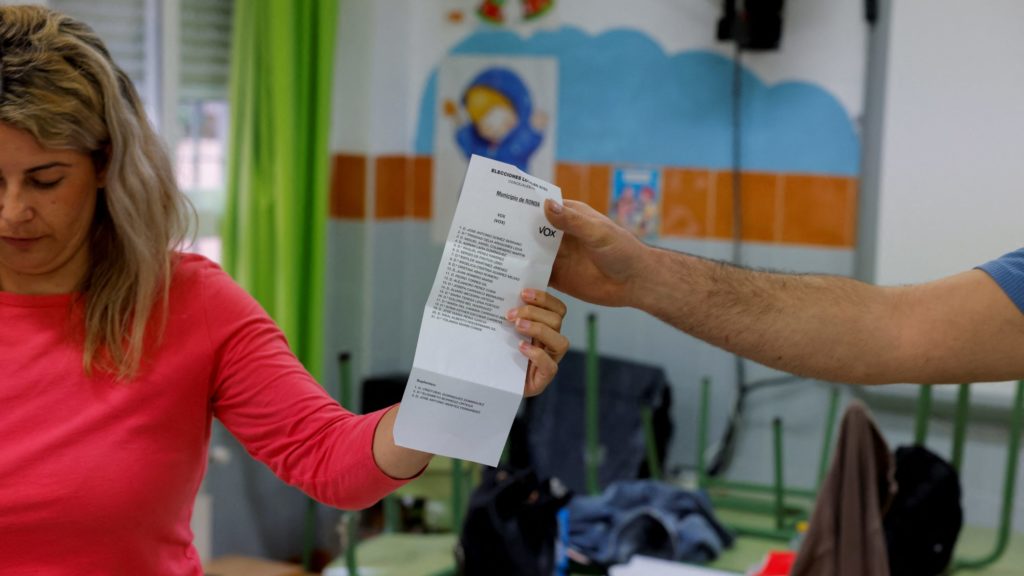The Spanish bishops' conference has warned of growing tensions ahead of a snap July parliamentary election, as Catholic organizations expressed hopes the ballot would curb the radical agenda of Prime Minister Pedro Sánchez's Socialist-led government.
"We are living in a strongly ideologized society, leading to polarizations and tensions," the bishops' Committee for Charitable and Social Action said in a June 11 message.
"We are also deeply saddened by the situation of people who suffer from increasing job insecurity, especially young people and families living in severe social exclusion, and those most affected by psycho-emotional deterioration," the committee said.
The message, published on the feast of Corpus Christi, said Spain faced "accumulated crises," with one in three citizens lacking enough income to "live in dignity," and urged Christians to "open their eyes to the suffering."
Meanwhile, a senior lay Catholic told OSV News that controversial laws could be repealed if conservative opposition parties prevailed in the July election, but said political pacts were already being formed at the local level to hinder their application following Sánchez government's poor showing on May 28 regional and municipal voting.
"With the general election now set, there are great expectations of change," said Juan Carlos Corvera, president of Spain's Educatio Servanda association, founded in 2006 to defend Christian education.
"While economic crises have always previously served as the main catalyst for political change in Spain, this could be the first time a government has been replaced for fundamentally ideological reasons."
Sánchez announced that elections to Spain's Cortes parliament were being advanced from December 2023 to July 2023 after the conservative opposition Partido Popular (PP) and Vox parties scored substantial gains in the May 28 vote, widely seen as a de facto referendum on his coalition government.
Meanwhile, the PP's leader, Alberto Núñez Feijóo, welcomed the election challenge, telling journalists the Spanish people favored "another way of doing politics."
In an OSV News interview, Corvera said Catholics hoped the PP and Vox would fulfill promises to repeal the Sánchez government's November 2020 Education Law -- which downgraded religious teaching and restricted state funding for Catholic schools -- and immediately draft a new bill reflecting a "greater consensus."
He added that some of Spain's 17 regions, including the capital, Madrid, had already sought to modify the law's implementation, such as by protecting and extending Catholic school subsidies.
"We need a practical law, not a political one, which allows each region to develop educational projects according to its own pedagogical criteria and models, respecting constitutional values," the Catholic education expert told OSV News.
"It must be a law that fosters plurality, competition and educational excellence, guarantees equal opportunities and leaves behind disastrous paradigms of egalitarianism in favor of paradigms of freedom," Corvera said.

Sánchez became the first prime minister of Spain to decline taking his inaugural oath on the Bible in June 2018, and formed a left-wing coalition with the Podemos party in January 2020 under a program pledging liberal changes.
Besides the Education Law, the Catholic Church has clashed with the government over laws liberalizing abortion and state-funded euthanasia, and permitting 16-year-olds to re-register their gender via a court declaration.
A Democratic Memory Law, adopted in October, will ban crosses and monuments deemed to exalt the former dictatorship of Gen. Francisco Franco (1892-1975), while tax exemptions on church donations and public works, established in 2001 by an agreement with the Vatican, also were scrapped March 29.
However, in a June 8 editorial, the Madrid Archdiocese's Alfa y Omega Catholic weekly accused Sánchez's government of prioritizing "ideological projects" over laws against trafficking and patient neglect and said at least 50 legislative initiatives had now been suspended pending the July election, including a draft Family Law recognizing 16 different family types.
Meanwhile, Corvera said the Education Law had inflicted "financial asphyxia" on Spain's 2,548 Catholic schools, which employ 106,000 teachers and take a quarter of all pupils but now received less than half the public support assigned to state schools.
He added that most were desperately seeking to survive under the law, which was the eighth enacted since the 1978 restoration of democracy in Spain, through parental donations and lower teacher salaries.
"Education is conceived, especially on the left, as a tool for ideological indoctrination, a quarry where future social change can be modeled for the convenience of the ruling politicians," Corvera said.
"All the ideological laws approved by the coalition government contain specific clauses applying to schools and seriously threatening parental authority," he added. "If the Socialist Party wins the elections again and forms a new extreme-left pact, it will continue its ideological agenda with even greater virulence."
Although 53.7% of Spain's 47 million inhabitants still identify as Catholic, according to March data, religious vocations and Mass attendance have dropped sharply across the church's 70 dioceses and 23,000 parishes, while well over half of all 18- to 34-year-olds declare themselves nonreligious.
In its June 11 message, the bishops' committee said inflation and spiraling energy costs had increased "poverty, inequality and despair," with around half of all Spaniards forced to cut spending on food and home supplies, according to a recent Caritas report.
It added that church leaders were concerned about a "growing social disengagement" and "crisis of care and belonging" across Spain and said Christians were called to "open doors, give life, alleviate loneliness and heal souls."

